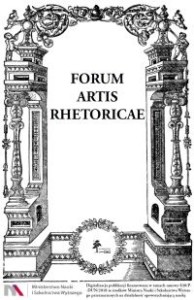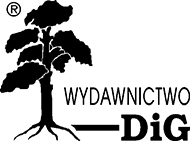Lector Benevole,
Gdy na początku roku 2020 Redakcja zdecydowała, iż cały rocznik, podzielony na
cztery tomy, zostanie poświęcony tematowi RETORYKA I MANIPULACJA oraz
opublikowany jako seria samodzielnych publikacji (każda z własnym ISBN), nic
nie wskazywało, że czeka nas całkowita zmiana sytuacji w kraju.
Dwa pierwsze tomy z serii RETORYKA I MANIPULACJA przynoszą studia,
które w swym założeniu są analityczne. Pokazują one jak autorzy — w sposób
świadomy bądź nieświadomy — manipulują informacją, która, zdaniem Redakcji,
mogłaby być przekazana w sposób prosty i jednoznaczny.
Tom trzeci przynosi studia dotyczące różnych aspektów retoryki oraz manipulacji,
związanych m.in. z zagadnieniami pedagogiki specjalnej. Tom ten w głównej
części poświęcony jest problemom, które są przedmiotem badań w Akademii
Pedagogiki Specjalnej im. Marii Grzegorzewskiej w Warszawie1. Warto pamiętać,
że „z inicjatywy i staraniem Marii Grzegorzewskiej, wielkiej humanistki w 1922 r.
Ministerstwo Wyznań Religijnych i Oświecenia Publicznego podjęło decyzję
o połączeniu Państwowego Seminarium Pedagogiki Specjalnej oraz Instytutu
Fonetycznego im. Jana Siestrzyńskiego, powołując Państwowy Instytut Pedagogiki
Specjalnej (PIPS), […] którego dyrektorem została Maria Grzegorzewska”.
Zadaniem Instytutu było kształcenie nauczycieli, wykwalifi kowanych do
pracy z dziećmi niepełnosprawnymi zarówno w sferze fi zycznej, jak i umysłowej,
włączając w to również osoby „moralnie zaniedbane”.
Zajęcia dla studentów PIPS prowadziły — poza samą Marią Grzegorzewską —
m.in. tak wybitne osobistości polskiej pedagogiki, jak Józefa Joteyko, Janusz
Korczak, Janina Doroszewska, Halina Jankowska, Natalia Han-Ilgiewicz.
Dzięki wysiłkom Marii Grzegorzewskiej PIPS po II wojnie światowej wznowił
działalność już 15 maja 1945 r.
W 1970 r. PIPS został przekształcony w samodzielną placówkę typu naukowo-
dydaktycznego na prawach uczelni zawodowej, a sześć lat później, w 1976 r.,
już jako Wyższa Szkoła Pedagogiki Specjalnej im. Marii Grzegorzewskiej, uzyskał
uprawnienia uczelni akademickiej kształcącej na poziomie magisterskim.
W 2000 r. Wyższa Szkoła Pedagogiki Specjalnej im. Marii Grzegorzewskiej otrzymała
nazwę Akademia Pedagogiki Specjalnej im. Marii Grzegorzewskiej.
W ramach programu Erasmus APS utrzymuje kontakty z 48 uczelniami zagranicznymi.
Jednostki uczelni aktywnie uczestniczą w realizacji przedsięwzięć
badawczych z takich dyscyplin, jak pedagogika, pedagogika specjalna, psychologia,
socjologia, praca socjalna.
Studia autorów związanych z Akademią Pedagogiki Specjalnej im. Marii Grzegorzewskiej
w Warszawie to: Barbary Marcinkowskiej Retoryka osób z głęboką
niepełnosprawnością intelektualną (Rhetoric of people with a profound intellectual
disability), Ewy Lewandowskiej-Tarasiuk Świat za słów kurtyną…(Th e world
behind a curtain of words…), Karoliny Kondrackiej Retoryka dziecięcej manipulacji
(Rhetoric of child manipulation), absolwentki APS i współpracowniczki, Magdaleny
Ostolskiej Granice automanipulacji (Limits of the Self-Manipulation), Ewy
Ruszkowskiej Nieznośna lekkość manipulacji (Th e unbearable lightness of manipulation).
pracowniczki korporacji
Tom uzupełniają dwa studia, które wiążą się z głównym tematem tomów I–
IV Retoryka i manipulacja. Są to: Jakuba Z. Lichańskiego Retorzy antyczni oraz
techniki manipulacji: uwagi na marginesie traktatów Q. Cornifciusa i Eliusza
Arystydesa (Antique Rhetoricians and Manipulation Techniques: Comments on
the Margin of Treaties by Q. Cornifcius and Aelius Aristides) oraz Mirosława Ryszkiewicza
Retoryka polskiej postmodernistycznej powieści kryminalnej. Prolegomena
(Th e rhetoric of a postmodern Polish crime novel. Th e prolegomena).
*
Kind Reader!
When, at the beginning of 2020, the Editorial Board decided that the entire year,
divided into four volumes, would be devoted to the topic RETORICS AND MANIPULATION
and published as a series of independent publications (each with
its own ISBN), there was no indication that we would face a total change in the situation
in the country.
Th e fi rst two volumes of the series RETORICS AND MANIPULATION bring
studies that were intended to be analytical. Th ey show how the authors — consciously
or unconsciously — manipulate information that, in the opinion of the Editorial
Board, could be conveyed simply and unambiguously.
Th e third volume is mainly fi lled with studies on various aspects of rhetoric
and manipulation related to the situation of special education. Th is volume,
in the main part, is devoted to the issues that are the subject of research at
the Academy of Special Education. Maria Grzegorzewska in Warsaw. It is worth
remembering that the university — as we read on its website — „on the initiative
and eff orts of Maria Grzegorzewska, a great humanist, in 1922 the Ministry
of Religious Denominations and Public Education decided to merge the State
Seminary of Special Education and the Phonetic Institute. Jan Siestrzyński, establishing
the State Institute of Special Education (PIPS), […] whose director was
Maria Grzegorzewska”.
Th e task of the Institute was to educate teachers qualifi ed to work with disabled
children both in the physical and mental sphere, including also people who are
„morally neglected”.
Classes for PIPS students were conducted — apart from Maria Grzegorzewska
herself — i.a. such outstanding personalities of Polish pedagogy as Józefa Joteyko,
Janusz Korczak, Janina Doroszewska, Halina Jankowska, Natalia Han-Ilgiewicz.
Th anks to the eff orts of Maria Grzegorzewska, the PIPS resumed its activity
aft er World War II on May 15, 1945. In 1970, PIPS was transformed into an independent
research and teaching institution with the rights of a vocational university,
and six years later, in 1976, as the Maria Grzegorzewska Academy of Special
Education, it obtained the qualifi cations of an academic university educating at
the master’s level. In 2000, the Higher School of Special Education named aft er
Maria Grzegorzewska was named Akademia Pedagogiki Specjalnej im. Maria
Grzegorzewska.
As part of the Erasmus program, APS maintains contacts with 48 foreign
universities. University units actively participate in the implementation of research
projects in such disciplines as pedagogy, special education, psychology,
sociology, and social work.
Th e studies of authors associated with the Academy of Special Education
in Warsaw include: Barbara Marcinkowska Rhetoric of people with a profound
intellectual disability (Retoryka osób z głęboką niepełnosprawnością intelektualną),
Ewa Lewandowska-Tarasiuk Th e world behind a curtain of words… (Świat za słów
kurtyną…), Karolina Kondracka Rhetoric of child manipulation (Retoryka dziecięcej
manipulacji) — associate, Magdalena Ostolska Limits of the Self-Manipulation
(Granice automanipulacji), Ewa Ruszkowska Th e unbearable lightness of manipulation
(Nieznośna lekkość manipulacji) — corporate employee.
Th e volume is supplemented by two studies related to the main theme of volumes
I–IV Rhetoric and Manipulation. Th ose are: Jakub Z. Lichański Antique
Rhetoricians and Manipulation Techniques: Comments on the Margin of Treaties
by Q. Cornifcius and Aelius Aristides (Retorzy antyczni oraz techniki manipulacji:
uwagi na marginesie traktatów Q. Cornifciusa i Eliusza Arystydesa) and Mirosław
Ryszkiewicz Th e rhetoric of a postmodern Polish crime novel. Th e prolegomena
(Retoryka polskiej postmodernistycznej powieści kryminalnej. Prolegomena).
Warszawa, 2020-05-25
Ewa Lewandowska-Tarasiuk
Akademia Pedagogiki Specjalnej im. Marii Grzegorzewskiej w Warszawie
Polski Uniwersytet na Obczyźnie, Londyn
ORCID: 0000-0002-9216-0305
Jakub Z. Lichański
Editor-in-Chief FORUM ARTIS RHETORICAE
ORCID: 0000-0002-1943-5069



 61 (2020)
61 (2020)
